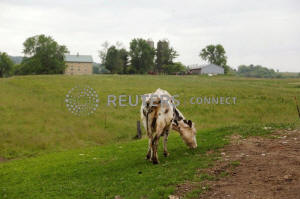Farm loan delinquencies surge in U.S. election battleground Wisconsin
 Send a link to a friend
Send a link to a friend
 [September 06, 2019] [September 06, 2019]
By Jason Lange and P.J. Huffstutter
WASHINGTON/CHICAGO (Reuters) - Farm loan delinquencies rose to a record
high in June at Wisconsin's community banks, data showed on Thursday, a
sign President Donald Trump's trade conflicts with China and other
countries are hitting farmers hard in a state that could be crucial for
his chances of re-election in 2020.
The share of farm loans that are long past-due rose to 2.9% at community
banks in Wisconsin as of June 30, the highest rate in comparable records
that go back to 2001, according to a Reuters analysis of loan
delinquency data published by the Federal Deposit Insurance Corporation.
While the number of seriously delinquent farm loans is rising
nationwide, the noncurrent rate has more than doubled at Wisconsin's
community banks since Trump took office in January 2017. It now stands
higher than in any other of the top 10 U.S. farm states as measured in
production - a list that includes California, Iowa and Texas.
Nationwide, the share of farm loans at all FDIC-insured banks that are
at least 90 days past due or are no longer accruing interest because of
repayment doubts stood at 1.5% at the end of June, the FDIC data showed.

That marked the highest rate since 2012 but only about half the rate
seen at community banks in Wisconsin.
Wisconsin played a pivotal role in Trump's 2016 election victory and is
widely expected to be a battleground again in the November 2020 contest.
Farmers there could be feeling the pinch more than in other big farming
states like Iowa because Wisconsin's crops are touched by multiple
fronts of Trump's trade wars, including with China, Canada and Mexico,
said John Newton, chief economist at the American Farm Bureau
Federation, an agricultural lobby group.
Wisconsin's farmers also received smaller federal aid payments than
those of Iowa or Illinois, other major agricultural states hit by
foreign tariffs, during a first round of federal trade aid payments
meant to ease the economic pain of the trade wars, according to an
analysis by the Farm Bureau of federal government data on payments
through mid-May.
That bailout package focused on helping producers of soybeans, a crop
that is grown on more acres in Illinois and Iowa than in Wisconsin. The
government started taking applications for a second round of
farm-related trade aid in July.
After Trump in early 2018 ordered higher tariffs on all steel imports
and on a range of Chinese imports, China, Mexico and Canada quickly
responded with retaliatory tariffs targeting U.S. agriculture, including
Wisconsin's large dairy industry.
[to top of second column] |

A dairy cow is seen
grazing at a farm in Mayville, Wisconsin, U.S., June 24, 2019.
REUTERS/Darren Hauck

Although Canada and Mexico lifted tariffs on U.S. agriculture in May, the
U.S.-China trade war has dragged into a second year, keeping crop prices and
farm incomes low.
GRAPHIC: Wisconsin woes -
https://fingfx.thomsonreuters.com/
gfx/mkt/12/5734/5684/Wisconsin%20woes.png
'WE HAVE TO MAKE SOME MONEY'
One in nine jobs in Wisconsin are tied to its $88 billion agriculture industry
and the sector's woes, which have also grown due to severe weather this past
spring, could drag on the state economy.
Dave Daniels, a corn and dairy farmer in Kenosha County, Wisconsin, voted for
Trump in 2016 and still supports the president.
The drop in grain prices has helped his dairy by making it cheaper to buy feed
for his animals. But neighboring grain businesses are suffering and there are
few signs of things getting better ahead of the 2020 election year.
"The trade deals are in the back of everyone's mind right now," said Daniels,
64. "The thing everyone is saying is, 'we have to make some money this year.'"
Trump, a Republican, won Wisconsin in 2016 by just over 20,000 votes - less than
1% of ballots cast. The state backed Trump's predecessor, Democrat Barack Obama,
in the 2008 and 2012 elections.
Trump has pledged to overhaul America's trade relationship with the world,
reduce trade deficits and open up more markets to U.S. exports.
But his imposition of tariffs on major trading partners has triggered
retaliation that has hurt U.S. farmers. As more farmers have fallen behind on
their loans, big banks have also cut their agricultural loan portfolios.
Democratic candidates hoping to challenge Trump next year are seizing on the
growing economic pain in the Farm Belt to peel away some of Trump's support in
rural America.
Jim Zimmerman, a corn farmer in Fond du Lac County, Wisconsin, said he was still
holding out hope that they could be better off in the long run.
Zimmerman, who voted for Trump in 2016, said it was too soon to decide how - or
if - he will vote in November 2020.
"But talk to me in six months, and if nothing is resolved? It'll be a different
story," he said.
(Reporting by Jason Lange in Washington and PJ Huffstutter in Chicago; Editing
by Soyoung Kim and Matthew Lewis)
[© 2019 Thomson Reuters. All rights
reserved.] Copyright 2019 Reuters. All rights reserved. This material may not be published,
broadcast, rewritten or redistributed.
Thompson Reuters is solely responsible for this content. |